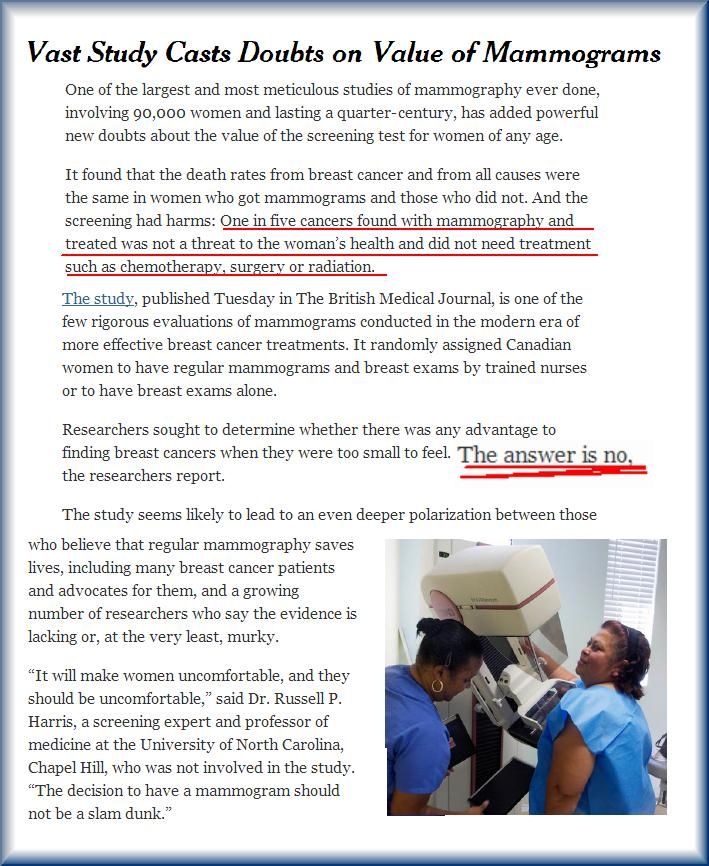Vast Study, Mammograms Do More Harm Than Good?
Vast Study, Mammograms Do More Harm Than Good
OK, it appears; I've been proven, right (correct) again... I've lived long enough to see the advent of mammography in our daily life and right from the start, I had my suspicions. It just didn't make sense that a yearly, (or any time) injection of toxicity into the breasts could be beneficial and not have, whatsoever, any harmful effects. Look at the below stats and come to your own conclusion. thinkingblue
80 percent, of breast lumps are NON-cancerous.70 percent, of breast cancers are found through self breast-exams.About 80 percent of women diagnosed with breast cancer have no family history of breast cancer.The toxic effects of mammogram radiation are finally being acknowledged as a significant factor in the development of breast cancer. Several recent studies have clearly shown that breast cancer screenings may be causing women more harm than good.MORE HERE: http://articles.mercola.com/sites/articles/archive/2012/03/03/experts-say-avoid-mammograms.aspx
~~~~~~~~~~~~~~
PS: BTW, I've only had one in my life and that was one too many! If I had had one every year since age 20, that would be 50 mammograms instead of the one, (none of which I needed). thinkingblue

Article Here: http://www.nytimes.com/2014/02/12/health/study-adds-new-doubts-
about-value-of-mammograms.html?hpw&rref=health&_r=0
about-value-of-mammograms.html?hpw&rref=health&_r=0
Risks and dangers of mammography in women younger than age 50:Higher risk for breast cancer risk due to radiation exposureRoutine mammograms in young women increase the risk for future breast cancer due to direct radiation exposure to breast tissue. For young women who have a high risk of breast cancer because of genetic mutations, the radiation from yearly mammograms may make the risk even higher. It is quite possible that women who may never have developed breast cancer in their lifetime may get this disease in their 50s, 60s, or later, from having routine yearly mammograms in their 30s or 40s. We are exposing millions of young women to such radiation without fully understanding the future impact. Low-dose radiation from mammograms and chest X-rays increases the risk of breast cancer in young women who are already at high risk because of family history or genetic susceptibility. High-risk women, especially those under 30, may want to consider switching to an alternative screening method such as magnetic resonance imaging, or MRI, which does not involve exposure to radiation. The annual mammograms gives a much higher dose of radiation than a typical chest x-ray. and it has accumulative effect on the body. In addition to exposing the body every year to radiation, many women must have additional screening when they receive a false-positive result, adding to further radiation exposure. Nobody knows exactly how much the risk for cancer is increased due to having regular mammograms in young women, but it is quite possible that the medical establishment and the American Cancer Society are not emphasizing this risk, or are not aware of it, as much as they should.The premenopausal breast is very sensitive to radiation, each rad of exposure increasing breast cancer risk by 1 percent, resulting in a cumulative 10 percent increased risk over ten years of premenopausal screening, usually from ages 40 to 50. Risks are even greater for "baseline" screening at younger ages, for which there is little or no evidence of any future relevance. Statistically, some women have approximately as much chance of getting breast cancer from repeated mammograms as they have of the testing finding earlier cancers. Yes, you might be one of those rare women whose life expectancy may be enhanced by early detection. But you might also be someone who develops breast cancer from the yearly radiation exposure. See this excellent article written by a respected university affiliated medical doctor that reviews the risk of radiation from mammography and exposes the profit motive of certain corporations and organizations, and forward this article to anyone who you think would benefit, including your doctor,http://www.thehastingscenter.org/Bioethicsforum/Post.aspx?id=4194Article Here: http://www.raysahelian.com/mammography.html
Who invented the first mammography machine?X-rays were used until 1966 when the first mammography machine was developed. Albert Salomon is considered to be the inventor of breast radiology. Source(s): http://www.gehealthcare.com







<< Home